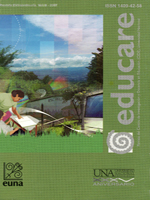Formación docente y saberes locales: una mirada desde la ruralidad. Venezuela
DOI:
https://doi.org/10.15359/ree.2-Ext.1Keywords:
local and modern knowledge, education, rural contextsAbstract
Teacher's education in Latin American countries is surrounded by complexity and contradiction. Teachers reproduce continuously and mostly unconsciously modern knowledge inherited of western culture. However, the context of educational activity exhibits great richness, which has been accumulated from the wisdom of people ignored in the curricula of formal educational programs. The article proposes the urgent need of giving social and cultural relevance to the knowledge that is being taught in schools. Two key aspects are proposed: first, giving academic status to local knowledge, powered by the emerging episteme of the crisis of modernity; and second, the necessity of establishing an intercultural dialog between local and universal knowledge, in order to take advantage of its strengths, assuming a synergic posture about human knowledge.
References
Arratia, O. (1999). Cassettejoro y la revalorización del saber campesino. Universidad
Mayor de San Andrés, Facultad de Ciencias Sociales. Tesis de pregrado
no publicada para optar al título de comunicación social, La Paz, Bolivia.
Bohórquez, C. ( 1988). Violencia, filosofia e historia en América Latina en ¿ Hacia
donde va América Latina? Gastón Parra Luzardo ( coordinador, 1996). Venezuela:
Editorial LUZ.
Castro, S. (1996). Crítica de la razón latinoamericana. España: Editorial Puvill
Libros, S. A.
Castro Gómez, S. (2000). Ciencias sociales, violencia epistémica y el problema de
la invención del otro en la colonialidad dél saber: eurocentrismo y ciencias
sociales. Perspectivas latinoamericanas. Venezuela: Edgardo Lander-Editor,
edición FACES/UCV-UNESCO.
Córdoba. (2002). Defensa de Tesis Doctoral en VI jornadas institucionales de investigación.
Instituto Pedagógico Rural Gervasio Rubio.
Cortés, l. (2002). Educación, globalización y universidad. Conversatorio en el Nú
cleo de Investigación en Educación, Cultura y Cambio (EDUCA). Instituto
Pedagógico Rural Gervasio Rubio, Estado Táchira.
Delgado, F. ( 1998). El conocimiento científico y el saber local en un diálogo intercultural
para el fortalecimiento de la gestión municipal y el desarrollo sostenible.
AGRUCO de agricultura Nº 30. Recuperado en: http://www.agruco.
org/articulo6. l html, Bolivia.
García C. (1989). Culturas híbridas: estrategias para entrar y salir de la modernidad.
México: Editorial Grijalbo.
Giroux, H. (1995). Teoría y resistencia en educación. España: Editorial Siglo XXI.
Moreno, A. (2002). Defensa de Tesis Doctoral en VI jornadas institucionales de
investigación. Instituto Pedagógico Rural Gervasio Rubio.
Morin, E. (1999). Los siete saberes necesarios para la educación del futuro. Colombia:
UNESCO, Editorial Cooperativa del Magisterio.
Núñez, J. (2000). Disonancias epistemológicas en la educación rural venezolana
(una aproximación a su interpretación). Mimeo. Doctorado en Educación,
Instituto Pedagógico Rural Gervasio Rubio.
Padrón, J. (1994). Modelo de las correspondencias entre enfoques epistemológicos
y estilos de pensamiento. Mimeo. Universidad Simón Rodríguez, 1-13.
Parra de Chópite, B. 2002. Foro sobre formación docente. VI jornadas institucionales
de investigación. Instituto Pedagógico Rural Gervasio Rubio.
PRATEC (1998). La regeneración de saberes en los andes. Lima, Perú: Gráfica
Bellido.
Published
How to Cite
Issue
Section
License
1. In case the submitted paper is accepted for publication, the author(s) FREELY, COSTLESS, EXCLUSIVELY AND FOR AN INDEFINITE TERM transfer copyrights and patrimonial rights to Universidad Nacional (UNA, Costa Rica). For more details check the Originality Statement and Copyright Transfer Agreement
2. REUTILIZATION RIGHTS: UNA authorizes authors to use, for any purpose (among them selfarchiving or autoarchiving) and to publish in the Internet in any electronic site, the paper´'s final version, both approved and published (post print), as long as it is done with a non commercial purpose, does not generate derivates without previous consentment and recognizes both publisher's name and authorship.
3. The submission and possible publication of the paper in the Educare Electronic Journal is ruled by the Journal’s editorial policies, the institutional rules of Universidad Nacional and the laws of the Republic of Costa Rica. Additionally, any possible difference of opinion or future dispute shall be settled in accordance with the mechanisms of Alternative Dispute Resolution and the Costa Rican Jurisdiction.
4. In all cases, it is understood that the opinions issued are those of the authors and do not necessarily reflect the position and opinion of Educare, CIDE or Universidad Nacional, Costa Rica. It is also understood that, in the exercise of academic freedom, the authors have carried out a rogorous scientific-academic process of research, reflection and argumentation thar lays within the thematic scope of interest of the Journal.
5. The papers published by Educare Electronic Journal use a Creative Commons License:














 The articles published by Educare Electronic Journal can be shared with a Creative Commons License:
The articles published by Educare Electronic Journal can be shared with a Creative Commons License: 



